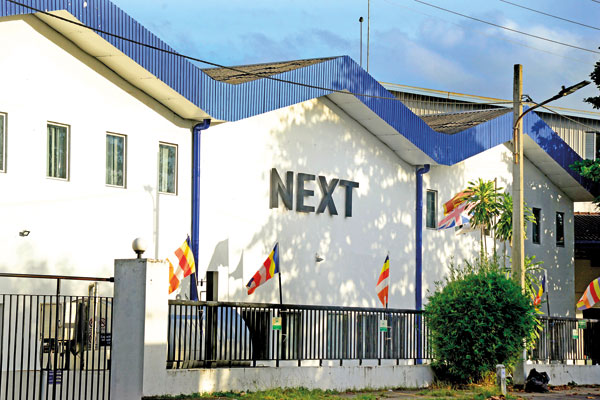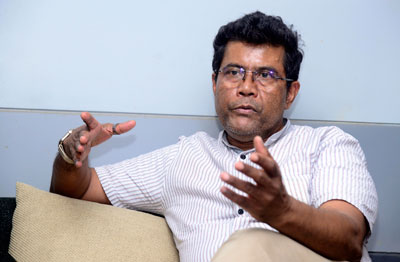News
Worker rights violations surface after NEXT factory shutdown
View(s):By Tharushi Weerasinghe
Workers have been left in limbo following the abrupt closure of a sewing factory within the Katunayake Free Trade Zone, leading to the laying off of some 1,400 workers, some of whom have worked for almost two decades.
“I went in expecting to finish my shift at 7 p.m. like I have done for most of the past 19 years, but suddenly they walked in and told us to pack up and leave at 5 p.m.,” said a 49-year-old worker who claims that workers were unaware of what was happening even at that point.
On the way out, workers were asked to give their WhatsApp numbers and were then sent a text message notifying them of the factory’s closure and termination of employment.

Shutdown: Next factory at the centre of a controversy. Pic by Indika Handuwala
“When they asked for our WhatsApp, I asked if something was wrong,” noted another worker. The management had repeatedly dismissed their concerns.
Multiple workers also told the Sunday Times that the factory scaled up production the week before its shutdown by increasing work hours. “I have never worked on a Sunday before at this factory, but this week they brought us in to work.”
NEXT Manufacturing ended operations on Monday night, citing unmanageable costs, and laid off 1,400 workers—an action that, according to authorities, violated protocols governing companies registered under the Board of Investment (BOI). Under the Termination of Employment of Workmen (Special Provisions) Act (TEWA), such a closure requires prior approval from the Labour Commissioner, along with formal notification to the BOI and relevant trade unions, ensuring that existing collective bargaining agreements— which guarantee union leaders a discussion before such decisions are made—are upheld.
NEXT’s management was summoned to Colombo on Thursday for a meeting with the BOI and the Labour Ministry to notify it of these violations.
“The company explained that the factory had made losses of over Rs. 10 million in the past six years since 2019,” said Deputy Labour Minister Mahinda Jayasinghe. He added that the company had, however, presented its compensation plan in accordance with TEWA for the workers who are being laid off.
Trade unionists who met the authorities on Friday, however, had rejected the offer. “They felt that they would rather have the job and that the compensation at play was not reasonable,” he noted. The FTZ and General Service Trade Union rejected the claim that the plant is not profitable and pointed out that the NEXT group globally had just reported record sales and profits.
In March, CEO Simon Wolfson reported that pre-tax profits had climbed by 10% to slightly over £1 billion for the year ending in January, driven by an 8.2% rise in sales to £6.3 billion, largely fuelled by strong international growth and increased sales of third-party brands.
But NEXT Manufacturing in Sri Lanka claimed that operations in the plant here had been on a dive for six years. “We understand the point both parties are making but have urged NEXT to reconsider its decision,” Mr Jayasinghe said.
He said the union sought a meeting with the management, a request which the authorities had passed on to the company. “The management was hesitant to meet them because of a hostile strike that lasted 17 days in 2021 and involved intimidation, but we have promised to ensure security when both parties come to the table this time,” the deputy minister said.
He noted that there were no provisions to permit disciplinary action over circumvention of protocol but added that it was against the country’s interests to be hostile to investors at a critical juncture like this. “But laws will be amended to ensure this will not happen again,” he assured.
When the Sunday Times visited the factory premises on Friday and spoke with workers, they claimed that there was new information about the factory restarting, adding to their anxiety and confusion. “I worked in this section of the company for decades, and I don’t know if I am young enough to get hired anywhere else either, now, but the union is advising us not to sign any papers the company gives until we have more information,” another worker said.
In a statement following its closure, NEXT Manufacturing Director David Reay claimed that “increasingly high operational costs” were at the “heart of the decision”. The Sunday Times reached out to Mr. Reay for clarification on which specific costs the company was referring to but did not receive a response in time for printing.
Flashback to 2014 when factory workers were hit by food poisoningNext Manufacturing, now under scrutiny once more, previously made headlines in 2014 when a mass food poisoning incident left over 500 workers ill. On September 5 that year, more than 150 workers were hospitalised after eating a factory-provided lunch—rice and curry with fish. Eighty-five were admitted to the Negombo District Hospital, with two placed in the ICU.  Workers receiving treatment then Among them was K. Gnanawathie, who had earlier reported feeling unwell to the factory sick room. Told to return to work, she later collapsed and was rushed to the hospital, unconscious. She passed away two days later on September 7. While the Judicial Medical Officer ruled her death was due to a ruptured blood vessel, not food poisoning, workers said the management’s response lacked compassion.
| |
| Ageing Katunayake zone and uncertainties bother industry
While industry leaders claimed that this specific factory’s closure was “ad hoc and abrupt”, longstanding policy uncertainties and ‘dilapidated’ facilities are straining company confidence in the Board of Investment-controlled Free Trade Zone in Katunayake. “There are perennial issues like high taxes, continued uncertainty over GSP+, continued uncertainty over simplified value-added tax (SVAT), and [Donald] Trump’s tariffs,” Free Trade Manufacturers’ Association chairman Dhammika Fernando told the Sunday Times on Friday. The government introduced SVAT in 2011 to simplify VAT, support exporters, and curb corruption. The IMF is now recommending replacing it with a stronger VAT refund system, which exporters claim is adding to business stability. Mr. Fernando said the BOI’s lack of responsiveness and deterioration of facilities burden exporters. “Security used to be tight a few decades ago, but now they only check outbound cargo,” he said. “Unless there’s a tip-off or something suspicious, no one checks who or what goes in.” He said pilferage is a growing issue, with inside involvement suspected in several incidents. “We’ve asked the BOI to automate processes, cut down on manual handling, and install proper CCTV systems,” Mr. Fernando said. “In one case, robbers looted a warehouse with help from security officers.” He added that while companies must do their part to tighten internal controls, the BOI still has an obligation to provide basic infrastructure and amenities. “Roads are crumbling, sewage lines—carrying both organic and inorganic waste—are outdated, and parapet walls are broken in parts,” he said. “We’ve raised these concerns with the secretary, the chairman, and the director general, but there’s no meaningful cooperation. An FTZ as historic as Katunayake should be a model zone, not one in decline.”  Dhammika Fernando The Board of Investment, however, claims maintenance issues are not as bad as alleged. “We have a relatively good road network; security is maintained with stringent gate control,” said Katunayake Zone Director Ranjan Sibera, who added that there is CCTV at entrances and in some parts across the FTZ, with companies themselves handling their own CCTV on their premises. He claimed security checkpoints and customs checks were also in place. He denied that pilfering was a big issue but added that each company was responsible for the security of its property. The BOI handles cargo and factory facilitation, 24/7 fire and security services and infrastructure maintenance. “Factories usually maintain their own reservations, and this is a joint effort to maintain over 175 acres.” When the Sunday Times visited the zone on Friday, no significant road dilapidations were observed. Nor were there any security checkpoints beyond the entrance. The Sunday Times reached out to BOI Director General Renuka Wirekone for a comment on the policy concerns raised by companies but did not receive a response. “This isn’t a time to panic—it’s a time for clear, strategic action,” says Rajitha Jayasuriya, chairperson of the Sri Lanka Apparel Exporters’ Association (SLAEA), as the sector navigates cost pressures and workforce challenges. Like other global manufacturing hubs, Sri Lanka’s apparel exporters are under significant cost strain. “When companies speak of rising costs, they mean everything— from volatile global raw material prices and surging freight rates to escalating energy expenses and a shrinking skilled labour pool,” explains Ms. Jayasuriya. The labour issue has worsened—skilled workers go to work overseas. Despite these hurdles, the industry is responding. “The industry has always shown resilience,” he says. Companies are adapting through lean manufacturing, digitalisation, product diversification, and targeting new markets. Many are also preparing to join exposure visits to top manufacturing nations, initiated by the EDB, to build innovation and technical capacity. Ms. Jayasuriya confirms that the SLAEA, in collaboration with other industry bodies, is in “active and ongoing engagement” with government authorities to advocate for policy stability and competitive support. Key areas include retaining transitional systems like SVAT until digital alternatives are fully tested, ensuring consistent and reliable policy frameworks that safeguard investor and buyer confidence, and accelerating trade agreements to open new export avenues. There are encouraging signs. “The Central Bank’s recent interest rate reductions aim to ease cost burdens for businesses,” notes Ms. Jayasuriya. Meanwhile, the BOI is stepping up efforts to attract foreign direct investment, and the government has shown a “constructive and timely response” in its engagement with the US Trade Representative, critical for an industry heavily dependent on the US market. At home, however, she urges caution. “Maintaining transparency and accountability in rolling out the digital tax system to replace SVAT will be critical,” he warns. A misstep could disrupt exporters and undermine trust in Sri Lanka’s trade policy direction. Sri Lanka risks losing cost competitiveness and agility in global sourcing strategies if labour shortages and escalating costs are left unaddressed. Demand slowdowns in important retail markets, continued workforce migration, and rising operational costs, especially for energy, are compounding the pressure. Still, Ms. Jayasuriya remains cautiously optimistic. Apparel exports continue to generate over US$5 billion annually. Companies are investing in long-term transformation through sustainability, automation, and resilience. The broader economy, she noted, is also showing signs of recovery, supported by tourism, investor interest, and capital market growth. “This can be a springboard,” she says. “But it depends on shared accountability between government and industry and continued trust from our global partners. That’s how we future-proof Sri Lanka’s apparel sector.” |
The best way to say that you found the home of your dreams is by finding it on Hitad.lk. We have listings for apartments for sale or rent in Sri Lanka, no matter what locale you're looking for! Whether you live in Colombo, Galle, Kandy, Matara, Jaffna and more - we've got them all!

